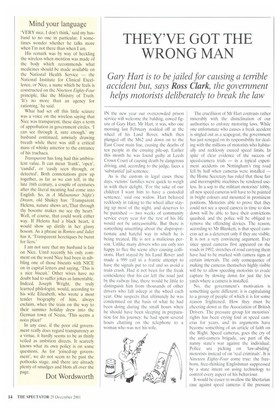Mind your language
'VERY nice, I don't think, said my husband to no one in particular. I sometimes wonder whether he talks more when I'm not there than when I am.
His remark was by way of heckling the wireless when mention was made of the body which recommends what medicines should be made available on the National Health Service — the National Institute for Clinical Excellence, or Nice, a name which he feels is constructed on the Nineteen Eighty-Four principle, like the Ministry of Truth. It's no more than an agency for rationing,' he said.
What had set off this little seizure was a voice on the wireless saying that Nice was transparent, these days a term of approbation in government circles. 'I can see through it, sure enough,' my husband continued, unwisely drawing breath while there was still a critical mass of whisky anterior to the entrance of his trachaea.
Transparent has long had this ambivalent value. It can mean 'frank', 'open', 'candid', or 'easily seen through, or detected'. Both connotations grew up together, as far as we can tell, in the late 16th century, a couple of centuries after the literal meaning had come into English. So, in A Midsummer Night's Dream, old Shakey has: 'Transparent Helena, nature shews art,/That through thy bosome makes me see thy heart.' Well, of course, that could work either way. If Helena had a black heart, it would show up dirtily in her glassy bosom. As a phrase in Romeo and Juliet has it, 'Transparent heretiques be burnt for tiers.'
I am not sure that my husband is fair on Nice. Until recently his only comment on the word Nice had been in nibbling one of those biscuits with NICE on in capital letters and saying, 'This is a nice biscuit.' Other wives have no doubt had to suffer jokes as lamentable. Indeed, Joseph Wright, the truly learned philologist, would, according to his wife Elizabeth, who wrote a most tender biography of him, always exclaim, when the train on the way to their summer holiday drew into the German town of Neuss, 'This seems a noiss place!'
In any case, if the poor old government really does regard transparency as a virtue, it hardly seems to be as thinly veiled as ambition directs. It scarcely knows what its own policy is on some questions. As for joined-up government', we do not seem to be past the pothooks stage, and there are already plenty of smudges and blots all over the
page. Dot Wordsworth


























































 Previous page
Previous page